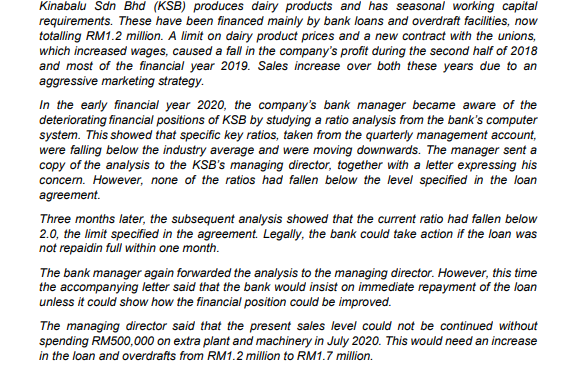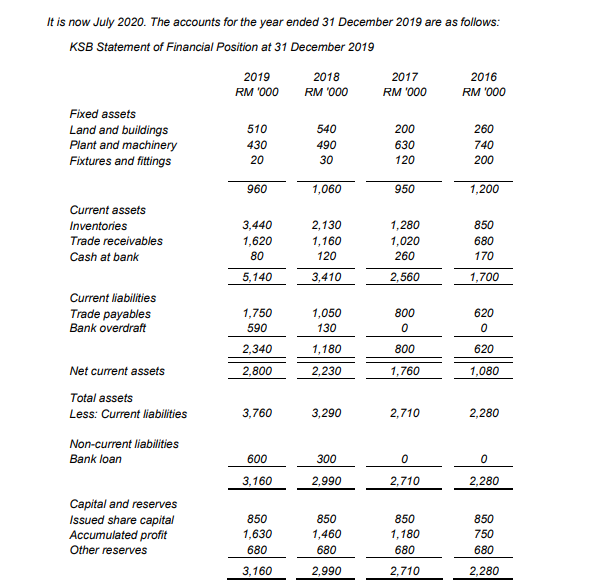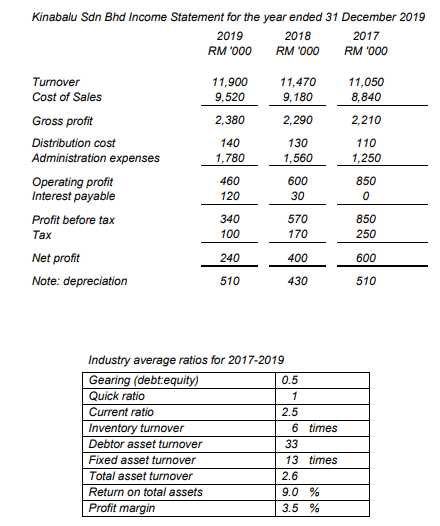



Kinabalu Sdn Bhd (KSB) produces dairy products and has seasonal working capital requirements. These have been financed mainly by bank loans and overdraft facilities, now totalling RM1.2 million. A limit on dairy product prices and a new contract with the unions, which increased wages, caused a fall in the company's profit during the second half of 2018 and most of the financial year 2019. Sales increase over both these years due to an aggressive marketing strategy. In the early financial year 2020, the company's bank manager became aware of the deteriorating financial positions of KSB by studying a ratio analysis from the bank's computer system. This showed that specific key ratios, taken from the quarterly management account, were falling below the industry average and were moving downwards. The manager sent a copy of the analysis to the KSB's managing director, together with a letter expressing his concern. However, none of the ratios had fallen below the level specified in the loan agreement Three months later, the subsequent analysis showed that the current ratio had fallen below 2.0, the limit specified in the agreement. Legally, the bank could take action if the loan was not repaidin full within one month. The bank manager again forwarded the analysis to the managing director. However, this time the accompanying letter said that the bank would insist on immediate repayment of the loan unless it could show how the financial position could be improved. The managing director said that the present sales level could not be continued without spending RM500,000 on extra plant and machinery in July 2020. This would need an increase in the loan and overdrafts from RM1.2 million to RM1.7 million. It is now July 2020. The accounts for the year ended 31 December 2019 are as follows: KSB Statement of Financial Position at 31 December 2019 2019 2018 2017 2016 RM 1000 RM '000 RM '000 RM '000 Fixed assets Land and buildings 510 540 260 Plant and machinery 430 490 740 Fixtures and fittings 20 30 120 200 200 630 960 1,060 950 1,200 Current assets Inventories Trade receivables Cash at bank 3,440 1,620 80 2,130 1,160 120 1,280 1,020 260 850 680 170 5,140 3,410 2,560 1,700 Current liabilities Trade payables Bank overdraft 1,750 590 1,050 130 800 0 620 0 2,340 1,180 800 620 2,800 2,230 1,760 1,080 Net current assets Total assets Less: Current liabilities 3,760 3,290 2,710 2,280 Non-current liabilities Bank loan 600 300 0 0 3,160 2,990 2,710 2,280 Capital and reserves Issued share capital Accumulated profit Other reserves 850 1,630 680 850 1,460 680 850 1,180 680 850 750 680 3,160 2,990 2.710 2,280 Kinabalu Sdn Bhd Income Statement for the year ended 31 December 2019 2019 2018 2017 RM 1000 RM 1000 RM 1000 11,900 9,520 2,380 140 1,780 11,470 9,180 2,290 11,050 8,840 2,210 130 1,560 110 1,250 Turnover Cost of Sales Gross profit Distribution cost Administration expenses Operating profit Interest payable Profit before tax Tax Net profit Note: depreciation 460 120 600 30 850 0 340 100 570 170 850 250 240 400 600 510 430 510 Industry average ratios for 2017-2019 Gearing (debt:equity) 0.5 Quick ratio 1 Current ratio 2.5 Inventory turnover 6 times Debtor asset turnover 33 Fixed asset turnover 13 times Total asset turnover 2.6 Return on total assets 9.0 % Profit margin 3.5 % d. If the bank granted the additional loan, could the company pay off the loan by 31 December 2020? Explain. (8 marks) Kinabalu Sdn Bhd (KSB) produces dairy products and has seasonal working capital requirements. These have been financed mainly by bank loans and overdraft facilities, now totalling RM1.2 million. A limit on dairy product prices and a new contract with the unions, which increased wages, caused a fall in the company's profit during the second half of 2018 and most of the financial year 2019. Sales increase over both these years due to an aggressive marketing strategy. In the early financial year 2020, the company's bank manager became aware of the deteriorating financial positions of KSB by studying a ratio analysis from the bank's computer system. This showed that specific key ratios, taken from the quarterly management account, were falling below the industry average and were moving downwards. The manager sent a copy of the analysis to the KSB's managing director, together with a letter expressing his concern. However, none of the ratios had fallen below the level specified in the loan agreement Three months later, the subsequent analysis showed that the current ratio had fallen below 2.0, the limit specified in the agreement. Legally, the bank could take action if the loan was not repaidin full within one month. The bank manager again forwarded the analysis to the managing director. However, this time the accompanying letter said that the bank would insist on immediate repayment of the loan unless it could show how the financial position could be improved. The managing director said that the present sales level could not be continued without spending RM500,000 on extra plant and machinery in July 2020. This would need an increase in the loan and overdrafts from RM1.2 million to RM1.7 million. It is now July 2020. The accounts for the year ended 31 December 2019 are as follows: KSB Statement of Financial Position at 31 December 2019 2019 2018 2017 2016 RM 1000 RM '000 RM '000 RM '000 Fixed assets Land and buildings 510 540 260 Plant and machinery 430 490 740 Fixtures and fittings 20 30 120 200 200 630 960 1,060 950 1,200 Current assets Inventories Trade receivables Cash at bank 3,440 1,620 80 2,130 1,160 120 1,280 1,020 260 850 680 170 5,140 3,410 2,560 1,700 Current liabilities Trade payables Bank overdraft 1,750 590 1,050 130 800 0 620 0 2,340 1,180 800 620 2,800 2,230 1,760 1,080 Net current assets Total assets Less: Current liabilities 3,760 3,290 2,710 2,280 Non-current liabilities Bank loan 600 300 0 0 3,160 2,990 2,710 2,280 Capital and reserves Issued share capital Accumulated profit Other reserves 850 1,630 680 850 1,460 680 850 1,180 680 850 750 680 3,160 2,990 2.710 2,280 Kinabalu Sdn Bhd Income Statement for the year ended 31 December 2019 2019 2018 2017 RM 1000 RM 1000 RM 1000 11,900 9,520 2,380 140 1,780 11,470 9,180 2,290 11,050 8,840 2,210 130 1,560 110 1,250 Turnover Cost of Sales Gross profit Distribution cost Administration expenses Operating profit Interest payable Profit before tax Tax Net profit Note: depreciation 460 120 600 30 850 0 340 100 570 170 850 250 240 400 600 510 430 510 Industry average ratios for 2017-2019 Gearing (debt:equity) 0.5 Quick ratio 1 Current ratio 2.5 Inventory turnover 6 times Debtor asset turnover 33 Fixed asset turnover 13 times Total asset turnover 2.6 Return on total assets 9.0 % Profit margin 3.5 % d. If the bank granted the additional loan, could the company pay off the loan by 31 December 2020? Explain. (8 marks)










